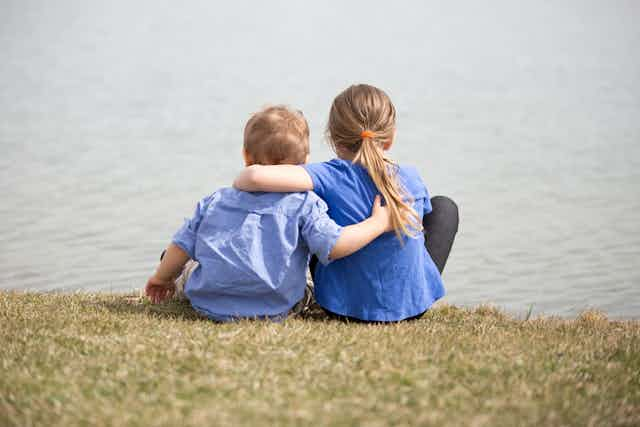When a child is diagnosed with cancer, the whole family suffers. Most research has looked at the emotional responses of the child with cancer and their mothers, but more recent work has investigated the experiences of fathers and siblings, too.
Our latest research set out to investigate the levels of post-traumatic stress symptoms in children with cancer and their siblings in a British sample. We found that about a third of the children with cancer and their siblings (in our sample of 60) had signs of post-traumatic stress. We were surprised to find that the levels of post-traumatic stress were the same for siblings and the patient.
Cancer diagnosis and treatment brings a lot of stress to the child with cancer and their family. Because of the shock often experienced at diagnosis, the frightening feelings that cancer causes and its intense treatment, post-traumatic stress symptoms are not an uncommon emotional response to the disease.
Post-traumatic stress disorder includes three main symptoms. One, having nightmares about the frightening event, such as nightmares about when the family was first told the child had cancer. Two, avoiding things linked to the frightening event (in this case, it could include avoiding medical settings or cancer-related topics on television). And three, being on high alert about things associated with cancer. For example, the child is very focused on things that might mean the cancer has returned even when they no longer have the illness, such as feeling anxious when they have a normal sickness bug.
The high rates of post-traumatic stress highlight how important it is to look at the family as a whole when treating a child with cancer. Research has suggested that how well a family adapts to cancer diagnosis and treatment can have an impact on the quality of life of the child with cancer.
Cognitive behavioural therapy
For our research, we also looked at things that might affect the levels of post-traumatic stress experienced by the children. We found that how the children thought about cancer had the largest impact on the levels of post-traumatic stress they experienced. This was irrespective of the type of cancer they had, how long or intense their treatment was, or the amount of social support they had.
This suggests that cognitive behavioural therapy, a therapy known to be helpful in treating post-traumatic stress in children who have experienced other frightening events, may also be helpful for children with cancer and their siblings.
As well as providing medical treatment, all families should be offered psychological support when a child is diagnosed with cancer. It is important to encourage children and siblings to ask questions about the cancer diagnosis and treatment.

Some researchers have started to look at the helpfulness of psychological therapy for siblings of children with cancer. But despite recommendations from the National Institute for Health and Care Excellence (NICE), which advocates access to “expert psychological support” and “sibling support groups”, talk therapy is not always offered to siblings, often due to limited healthcare resources. However, it is essential to help families to talk about cancer in a way that makes sense to children as it is likely to be helpful in preventing the development of post-traumatic stress symptoms for all family members.

